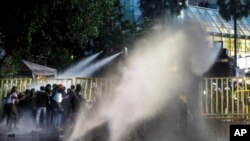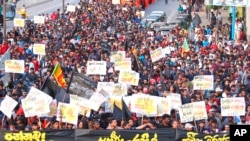The U.N. Human Rights Office is urging Sri Lankan authorities to rein in their security forces to prevent expected large-scale demonstrations from turning violent in Colombo on Saturday.
Human rights officials warn tensions are high because of Sri Lanka’s worsening economic crisis. They say they are worried that Saturday’s demonstrations, called to protest the rising cost of food, fuel and other commodities, could become as violent and deadly as those held in May.
During demonstrations in Colombo May 9-10, supporters of former Prime Minister Mahinda Rajapaksa attacked peaceful protesters, reportedly killing eight people and injuring more than 250.
U.N. Human Rights Office spokeswoman Ravina Shamdasani says worrying signs have emerged that Saturday’s planned peaceful protests could get out of control.
“Reports have been received of several confrontations between individuals and members of the police force and the armed forces at fuel stations where thousands of desperate members of the public have queued for hours and sometimes even days," she said. "Police have used tear gas and water cannons at times in an unnecessary and disproportionate manner. On occasions, armed forces have also fired live ammunition.”
Shamdasani says High Commissioner for Human Rights Michelle Bachelet has been in contact with Sri Lankan authorities on several occasions urging them to show restraint in the policing of assemblies. She has told authorities that all Sri Lankans have the right of freedom of assembly and expression, including through protests.
Shamdasani notes that under international law, using force to disperse gatherings can be permitted only as a last resort and must be proportionate.
“As a general rule, the military should not be used to police assemblies," she said. "In exceptional circumstances, where members of the military carry out law enforcement functions, they are bound by international norms and standards and must remain fully subordinate to the civilian authority, and they must be accountable under civilian law.”
Shamdasani says the high commissioner is calling on the government to hold an open and genuine dialogue to tackle the root causes of the crisis and grievances of the people.








